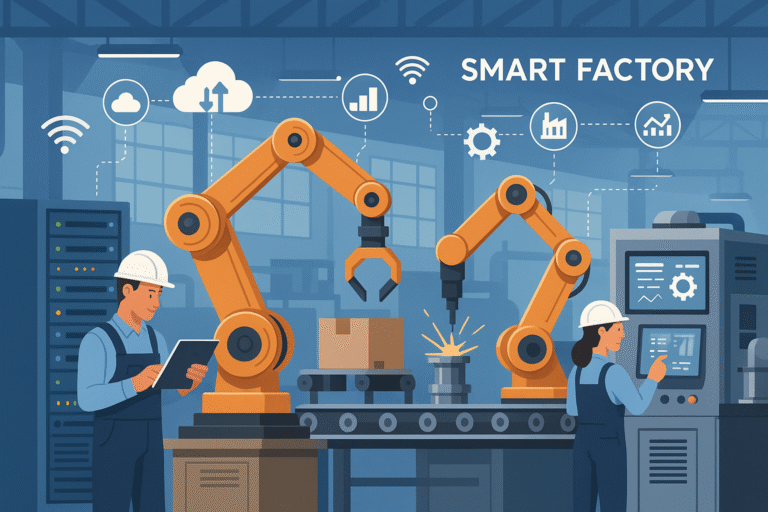In today’s fast-changing world, the way factories operate is going through a major transformation. This shift is part of what’s called Industry 4.0—a new era of manufacturing powered by smart technology. At the heart of this revolution are smart factories, which are more efficient, connected, and intelligent than traditional factories.
What Makes a Factory “Smart”?
A smart factory uses digital technologies to automate and optimise its processes. It combines machines, people, and data to work together in real-time. These factories can “think” and “learn” by collecting and analysing data, allowing them to make decisions on their own or alert humans when something needs attention.
Key Technologies in Smart Factories
Several technologies work together to make a factory smart:
- PLC (Programmable Logic Controllers): Used to control machines and automate processes.
- IoT (Internet of Things): Devices and machines are connected to the internet, allowing them to send and receive data.
- AI (Artificial Intelligence): Systems that learn from data to predict problems, improve processes, and even make decisions.
- Robotics: Robots handle repetitive or dangerous tasks with high speed and precision.
- Data Analytics: Data is collected, analysed, and used to improve efficiency and product quality.
- SCADA (Supervisory Control and Data Acquisition): Monitors and controls industrial systems from a central location.
- MES (Manufacturing Execution Systems): Manages the production process and ensures everything runs smoothly.
Benefits of Smart Factories
Smart factories bring many advantages:
- Higher efficiency: Automation speeds up production and reduces errors.
- Better quality: Constant monitoring helps catch defects early.
- Lower costs: Less waste, less downtime, and more accurate planning saves money.
- Sustainability: Smart systems use energy more wisely and reduce environmental impact.
Smart factories are more than just a trend—they’re the future of manufacturing. With technologies like IoT, AI, and robotics, factories can produce more with less, improve product quality, and reduce environmental impact. As Malaysia takes steps towards Industry 4.0 through NIMP 2030, smart factories will play a key role in shaping the country’s economic future.
Ready to take your business to the next level with automation?
At Mirai, we specialise in helping companies automate tasks and integrate smart technologies to boost efficiency and productivity. Whether you’re starting your smart factory journey or want to optimise existing processes, Mirai is here to support your transformation.
Contact us today to learn how Mirai can help your business become smarter and more competitive in the Industry 4.0 era!

